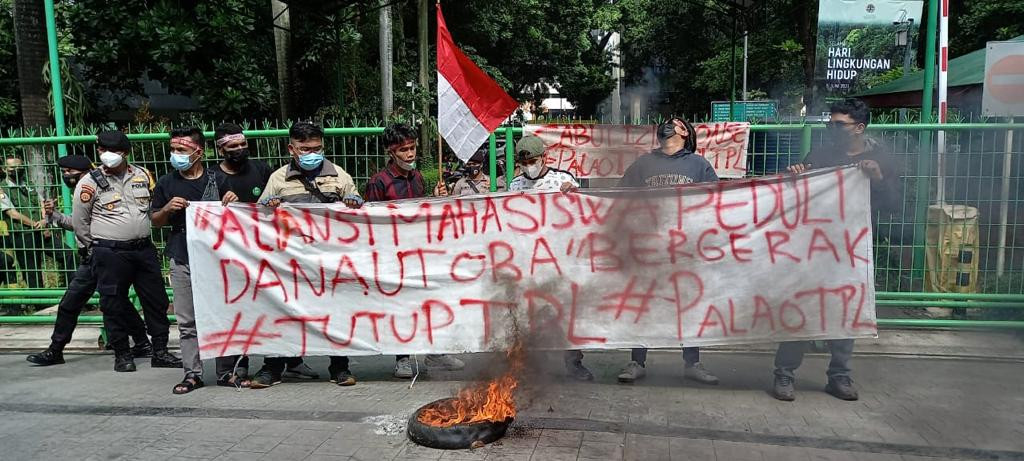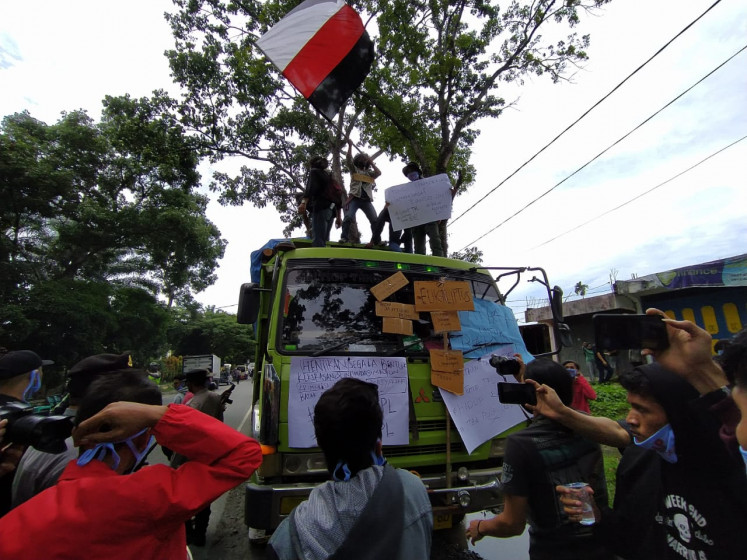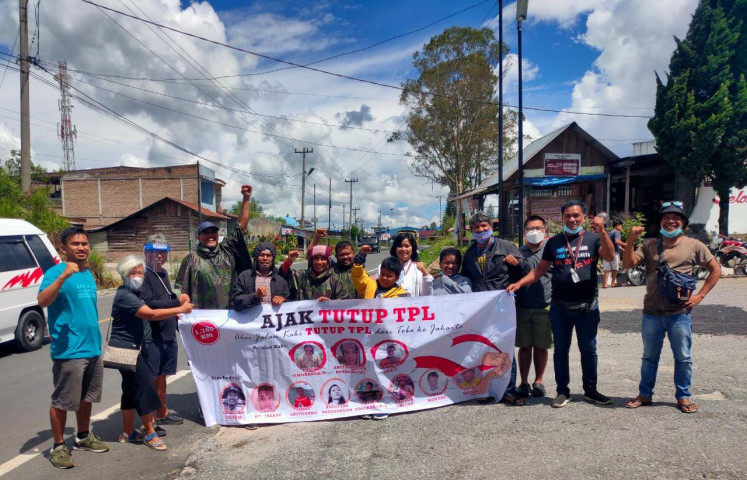Popular Reads
Top Results
Can't find what you're looking for?
View all search resultsPopular Reads
Top Results
Can't find what you're looking for?
View all search resultsBloody clash in Natumingka ignites Batak groups to rise against pulp giant
Indigenous Batak communities in North Sumatra are continue their tireless fight against big business to keep their customary lands.
Change text size
Gift Premium Articles
to Anyone
 Hear us roar: Members of the Lake Toba Lovers' Youth Student Alliance protest on June 4, 2021 in front of the Environment and Forestry Ministry in Jakarta. The protest was held in response to the violent clash that broke out on May 18 between the Natumingka community and PT Toba Pulp Lestari over a land concession in Toba regency, North Sumatra. (Aliansi Tutup TPL./Handout/Aliansi Tutup TPL.)
Hear us roar: Members of the Lake Toba Lovers' Youth Student Alliance protest on June 4, 2021 in front of the Environment and Forestry Ministry in Jakarta. The protest was held in response to the violent clash that broke out on May 18 between the Natumingka community and PT Toba Pulp Lestari over a land concession in Toba regency, North Sumatra. (Aliansi Tutup TPL./Handout/Aliansi Tutup TPL.)
J
usman Simanjuntak fell down, unconscious, his head bleeding from lacerations caused by a large piece of wood that was thrown at him. The 76-year-old was immediately taken to the village clinic for treatment.
Jusman was one of 12 people who were injured in a clash that erupted on May 18 between the employees of PT Toba Pulp Lestari (TPL) and the villagers of Natumingka in Borbor district, Toba regency, North Sumatra.
The incident occurred when local residents protested around 500 TPL employees who had arrived to plant eucalyptus trees on customary land in the village.
“Since 7 o'clock in the morning, around 80 residents, including women, have been gathered at the entrance to the village to block the arrival of TPL employees. At that time, the residents were empty-handed," said Jusman, recalling the day’s events at a virtual press conference on May 31.
The villagers blocked the road when the TPL employees arrived in a large convoy of trucks carrying eucalyptus seedlings, accompanied by security guards and policemen. The employees insisted on planting the trees, but the villagers continued to block their entry.
“The debate continued until noon but no deal was reached, [and then] there was pushing and shoving, throwing of stones and sticks. The atmosphere that afternoon became brutal, I heard that mothers were crying,” Jusman said.
Seeing that the situation was quickly unraveling, Jusman asked the villagers to return to their homes. “About a minute after I asked the villagers to go home, a piece of wood suddenly flew [through the air] and hit my head,” he said.
Long-standing land disputes
Land disputes have often descended into violence whenever TPL has obtained a forest concession in the seven districts surrounding Lake Toba.
According to the Association for the Study and Development of Community Initiatives (KSPPM), 23 indigenous communities in five Lake Toba districts are locked in a dispute with the pulp manufacturer, which is owned by lumber tycoon Sukanto Tanoto.
Natumingka village is one of these indigenous communities. Tensions increased between the village and TPL in April, after the company reported three villagers to the police who were then charged with land theft.
The three villagers had blocked TPL employees from planting eucalyptus trees on 600 hectares of land they owned, located in the 2,409 ha concession granted to TPL.
“Three of our villagers were reported to the police for trying to prevent TPL from planting eucalyptus. The company claims they have obtained concession permits for land in Janji Matogu village and Simpang Tolu hamlet,” Natal Simanjuntak, 41, told The Jakarta Post in April.
Apart from Natumingka village, the Sihaporas indigenous community in Simalungun regency is also involved in a land dispute with TPL. Several people of the community have been tried and convicted during the long-standing dispute, including Mangitua Ambarita, who was sentenced to two years in prison in 2002. Two others, Thomson Ambarita and Jonny Ambarita, were jailed for 9 months in 2019.
According to the records of the KSPPM and the Tano Batak branch of the Indigenous Peoples Alliance of the Archipelago (AMAN), since TPL started operations in 1992 under the entity name PT Inti Indorayon Utama, the company has acquired 25,000 hectares of indigenous land as part of its concessions.
“That is the data we have, and there might be similar cases in other places,” AMAN Tano Batak chairman Roganda Simanjuntak told the Post on June 9.
Other disputes over the years have led to the arrest of several local residents in customary Batak lands, including Dolok Parmonangan in Simalungun regency and Sabangan Ni Huta II village and Tornauli hamlet in North Tapanuli regency.
And in February 2013, police arrested 31 residents and declared 16 residents as suspects in the Pandumaan-Sipituhuta community in Humbang Hasundutan regency.
“Since TPL was established, hundreds of indigenous people have been criminalized. And calculating [the figure] since 2013 based on the records of AMAN Tano Batak and KSPPM, 50 indigenous people have been criminalized,” said Rocky Pasaribu of the KSPPM.
Civil Action
A number of civil organizations, including advocacy and student groups, are now taking action to stop TPL’s local operations. They deem that the company has denied their rights as indigenous peoples, caused conflict and damaged the environment.
Days after the clash in Natumingka, a group of students stopped a truck transporting eucalyptus wood in Pematangsiantar, shouting, “Close down TPL!” In Jakarta, a student demonstration demanded that the Environment and Forestry Ministry revoke TPL’s concession permits.
Battling Goliath: Environmental activist Togu Simorangkir (fourth right) and other activists hold up a banner calling for the closure of PT Toba Pulp Lestari operations on customary Batak lands in North Sumatra. (Sarma Hutajulu/Handout/Sarma Hutajulu)In the latest development on June 14, environmental activists Togu Simorangkir, Anita Martha Hutagalung and Irwandi Sirait, along with a team of eight other activists, started a two-month, 1,700-kilometer march Balige, Toba regency, to the State Palace, where they plan to meet President Jokowi and submit a petition to close TPL’s operations on Batak customary land.
TPL claims its operations are legal. According to Dedy Armaya, a spokesman of TPL communications coordinator Norma Hutajulu who hails from a Toba Batak clan, had a legal basis for developing an industrial forest plantation (HTI) in the area, pointing to several licenses mentioned on the corporate website.
He cited several legal documents dating back to 1984, along with the latest decision from the environment ministry dated July 28, 2020 on an initial concession area of 269,060 ha and the 167,912 ha that was its current area of operations.
Meanwhile, its operations adjacent to Natumingka village commenced in 1990 under annual concession permit No. 847.
"PT TPL has an official legal basis from the government,” Dedy stressed.
According to HKBP Nommensen University researcher Dimpos Manalu, concession permits issued to TPL under the New Order regime neglected indigenous rights, however, so land conflicts still occurred.
"Whereas in the cultural structure of the Batak community, the land is owned by a clan and they have generally lived on the land for more than a hundred years, [so] now they are being evicted once the concession permit is issued," he told the Post.
Dimpos called on the environment ministry to revise past permits issued to TPL and restore the rights of the indigenous communities in customary Batak territory.
Constitutional Court Decision No. 35/2002 defines customary forest as forest areas located on customary lands that belong to indigenous peoples and stipulates that customary forests no longer belong to the state. However, this has not been effective in protecting indigenous peoples, their lands or rights.
"In addition, the local government, especially the Toba regency administration, must be proactive in protecting the rights of its people, one of which is to immediately ratify the regional regulation on indigenous peoples," Dimpos said. If not, the land disputes and clashes between indigenous peoples and TPL would never end.












